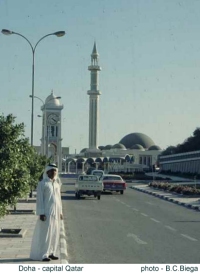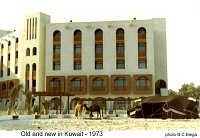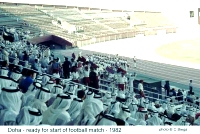 |
TRAVEL to GULF EMIRATES in the 1970s Part 2 - Kuwait, Qatar |
Bill Biega's History Essays |
|
The laws of the Emirate provided an income from the oil revenues for all native-born citizens. It became quite common to see a new Mercedes, or even a Rolls Royce, parked next to a tent in the desert with camels and goats grazing right next to it. All large companies were required to have a local as nominal CEO, but all the work was done by foreigners. Most of the professionals, such as engineers were Europeans, Egyptians or Lebanese. The middle levels of management, particularly in the government, were filled predominantly by Palestinians. Most of the lowest echelons of workers were Pakistanis, Indians, Indonesians. No foreigner had any right to permanent residency or hope of obtaining citizenship. This way the Emir maintained total control of his small butimmensely rich principality.

Qatar is a peninsula in the Persian Gulf (called the Arabian Gulf by Arabs). Originally inhabited by poor nomadic shepherds and pearl fishermen, it did not become an independent emirate until 1971. It suddenly became rich by the discovery of oil and gas deposits in the 1980s, currently it has one of the highest per-capita incomes in the world. The present Emir provides the most open political system of any Arab country - the media are subjected to virtually no control. However there are no political parties. Doha is the capital. In the 1980s the new wealth was used to transform the small sleepy town into a city of wide tree lined streets with buildings of striking architecture. This was the only Arab state in which I was invited to private homes, to enjoy dinners sitting on the carpet around a plastic cloth on which dishes of steaming rice, chicken and vegetables were arranged. My hosts and the other Arab guests ate with their bare right hand. They offered me a plate with a knife and fork, realizing that I might be uncomfortable eating with one hand. Naturally no women were to be seen and all the servants were also male.
Return to Part 1. Return to History Essays index. |
|
||||||||||||||||||||||
| ||||||||||||||||||||||||
| ||||||||||||||||||||||||



